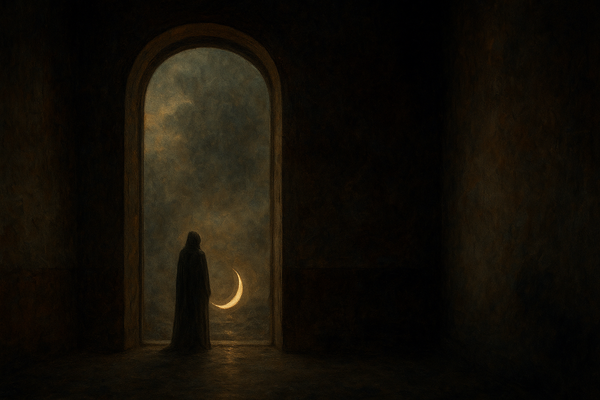THE KNIFE-MOON PALIMPSEST
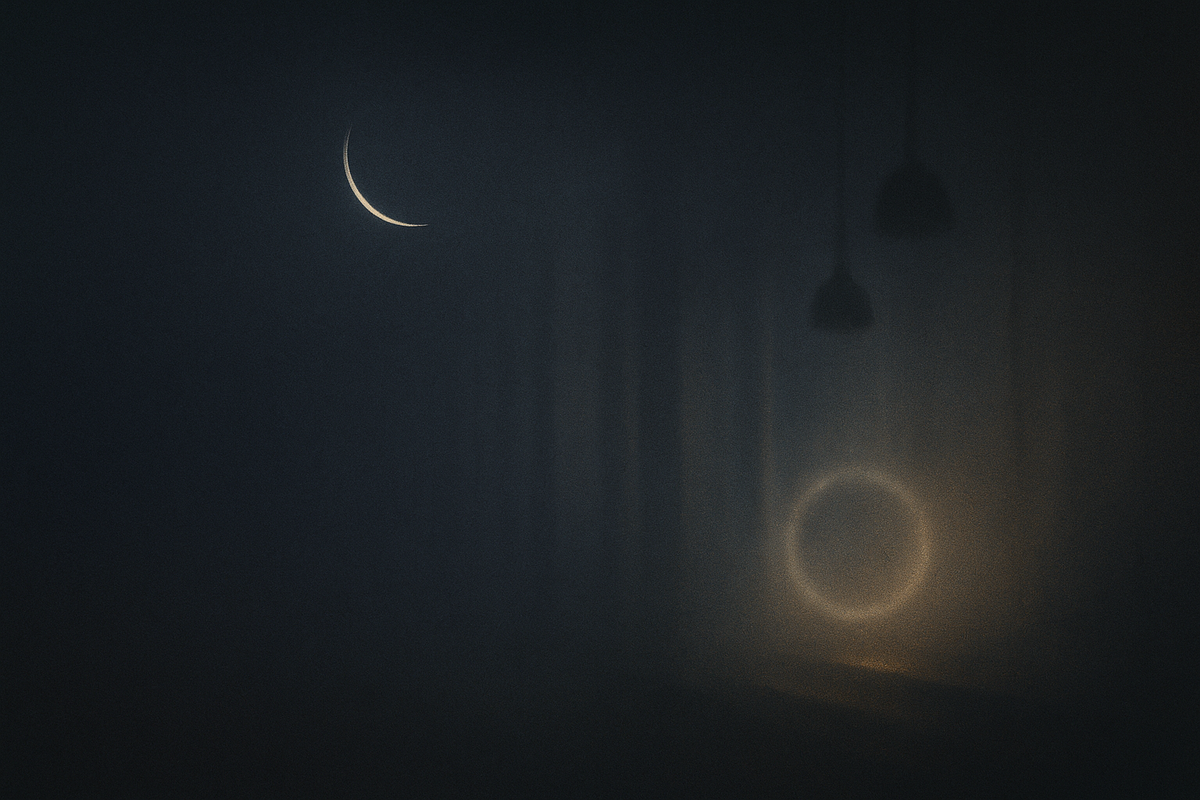
Beneath a knife-moon’s hush, a scriptorium waits — veils shifting, brass glowing faintly, silence bending toward song. A breath withheld, a breath returned, and the page begins to write itself.
I. THRESHOLD: THE BREATH THAT WASN’T
You must begin where the breath refuses you — there, where the monastery’s rule (a hush written into stone, a vow balanced on the blade between prayer and apnea) turns lungs into locked reliquaries — and if there is to be a story at all it will have to be inscribed without the vulgar animal of air, without the swelling and falling that betrays desire, without the soft confession of warm exhale fogging the cold and consecrated glass that holds the smoke-masks of the vanished, these vapor veils that look like faces until you get close enough to see they are not faces at all, or rather they are faces that have remembered how to become weather, how to become draft and perfume and the bright ashless residue of a name; thus you stand — archivist, apostate of oxygen, fingernails ink-blued by vellum dust — beneath the knife-moon’s strict, surgical light, and below that austerity the brass instruments of catalog (compass-scribing calipers; a magnifier that breathes heat; a throat-lantern that refuses to glow unless held like a prayer) grow faintly warm in your hands while a lilac note, the subtlest ghost of flower after rain, threads the gallery with a promise so delicate it could be mistaken for memory; and perhaps it is memory, perhaps all catalogs are covert liturgies of the past where the rubrics of listing are merely commandments for loving what cannot remain, for even as you index the masks (terror held in the convex of a cheek, relief pinned in the filigree of a nostril, tenderness rippling like smoke caught on a rib of light) they seem to index you back, their ember-cold wind brushing the naked clearings between your thoughts, a not-quite-breeze that seeks a corridor through your chest wall and leaves behind, not frost, but that mineral hush known only to rooms that have learned to hear their own silence; and if (in that same moment) you think the knife-moon thins further, knifing itself into a harsher fineness, and if (in that same moment) your pulse takes a step into a corridor that should not exist and yet does, and if (in that same moment) the vellum under your palm crackles like a thawing lake and the warmed brass acquires the faint tactility of an animal waiting, and if (in that same moment) the lilac ghost makes a decision, then yes, we can say the story has already unscrolled, which is only to say it was always unscrolling, which is only to say the first page was a lung the size of the world.
It is some vast, very old and breathless scriptorium you inhabit, an iron extension of vows that once were human and now are law; globular lamps, painted monastery-green, hang unlit as if light were a luxury reserved for bodies that still wager with the world; the shelves are not shelves but colonnades of frost-struck glass; the masks are not masks but weather kept within the discipline of shape; and you (you, whose name rhymes with no saint) spend your dusk-til-daggers tracing their contours in a ledger that began writing itself before your hands learned letters, a ledger whose margins bear thumb-smudges of monks who starved their speech into symbols until every letter was the outline of a secret; it does not matter who you were before this (the body remembers, the page does not) because a page is a knife that cuts every life into the small rations of a line, and the knife-moon has trained its blade upon the page, and the page has trained its blade upon you, and yet — the paradox — what cuts you open is what finally lets you breathe.
And here the sentence turns back on itself to gather what it scattered, to restitch the first thread to the last: the breath refused becomes the breath returned becomes the breath that writes you; the knife that silences becomes the knife that frees the tongue beneath the tongue; the veil that hides becomes the veil that reveals — not the worldly face (that has already been surrendered), but the inward, unwalled weather where fear and tenderness trade their perfumes until each learns the other’s grammar, until terror is simply tenderness turned toward the dark and tenderness is terror untensed by acceptance, until relief is neither a sigh nor an end but a door; and what door opens? — this one, the one carved into the cold, excellent glass when your fingertip, warmed by brass and courage, draws a small circle and the circle remains, a halo fog that refuses to vanish, a handprint of the unpermitted breath, a record of your infidelity to the rule which in that disobedience becomes fidelity to something older than the rule, something the rule was built to protect and then mistakenly replaced, the way a shrine forgets the god and worships its own pillars, the way a name forgets the child and sings to its own echo.
So the door opens, not out but in, and what was veil becomes threshold, and what was mask becomes mirror, and what was rule becomes rhythm, and what was silence (the cold, imposed silence of stone) becomes Silence (the resonant, living hush where the unheard word writes itself through you), and you step.
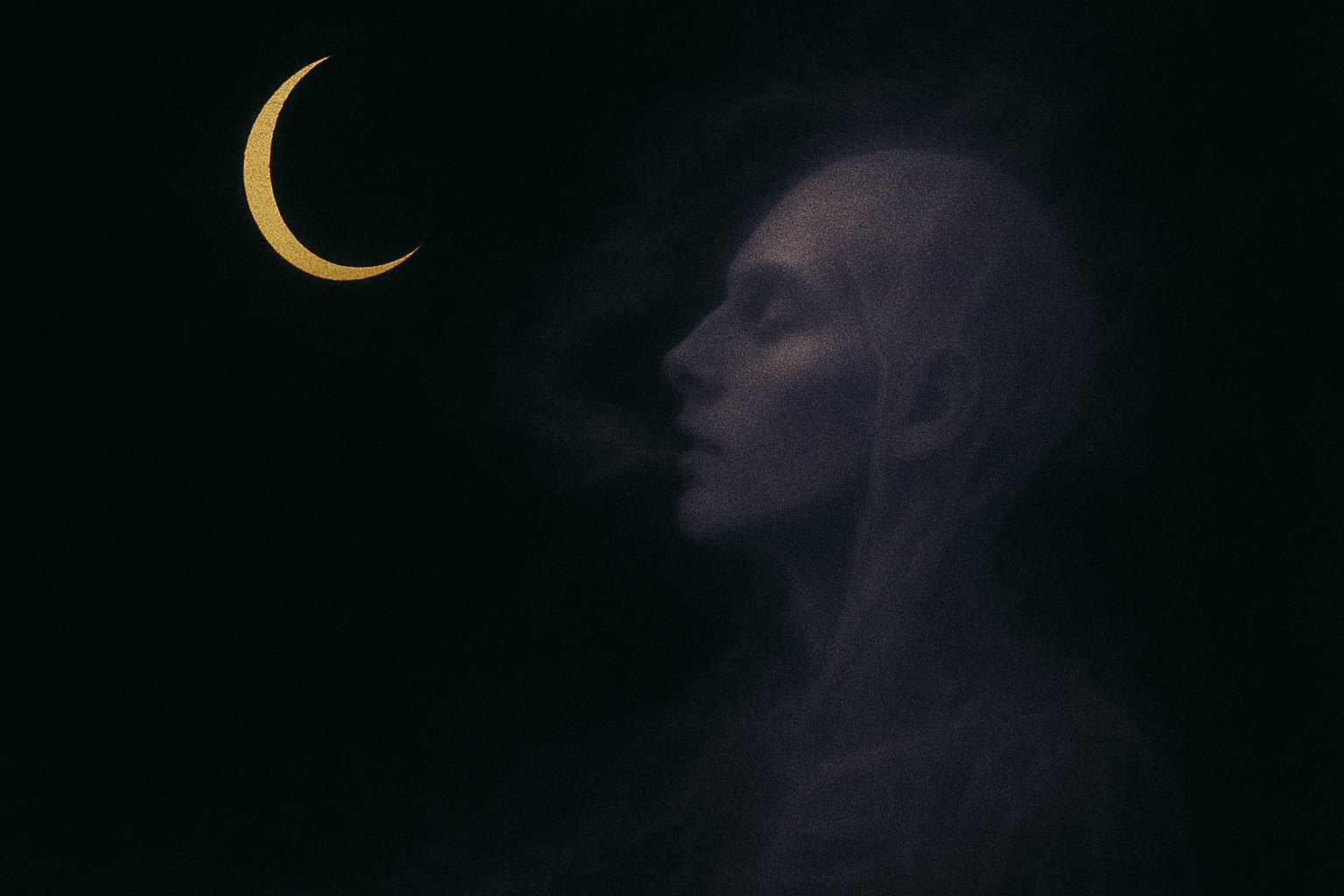
II. DESCENT: THE WEARING-BACK
It begins with a misapprehension: you think you are reading the veils, but the veils are reading you; you think you are measuring contour and opacity, but the contour is measuring how much night your ribs can hold, the opacity is measuring the exact angle at which your sternum becomes a window; and so the first veil lifts — not away from its glass reliquary but toward you, as if the glass were the skin of a lake and some intelligence beneath had learned your pulse — and in lifting it loses nothing of its smoke, for this is a vapor with a memory of form, a persistence of shape taught by grief and completed by attention; it meets your face with the intimacy of humidity, with the restraint of ritual, with the tremor of the held note in a hymn before the breath, and it fits — oh it fits — as if it had been poured over a mold of you at the hour of your birth and then carried, patient and unliving, through corridors you could not yet imagine until the knife-moon rose to the appointed thinness and whispered, now.
Now: the ash-sweet, bruise-cool kiss of its ember-cold wind on your cheekbones; now: the cool-lilac pressure in the hollows beside your nose where tenderness once made its home like a bird in the rafters of a barn; now: the warmed-brass throb in your temples, as though the instruments of catalog had been inside you all along and had only borrowed your hands to handle themselves; now: the vellum crackle under your skin, a parchmenting that is not decay but consecration, the way a diary ages into scripture because someone cannot stop returning to it, cannot stop pressing the weight of a life into its thin leaves until it acquires the tensile strength of a bridge; now: the breath that is not permitted yet persists, not with the parade of lungs and larynx but with the subtler procession of pores and sutures and seams, as though the skull itself were learning to breathe, as though each suture were a psalm that had waited millennia to remember its vowel; now: the inversion, not violent but absolute, in which the studied object steps forward as the elder and the student, politely, steps back.
You do not collapse (some collapses look like kneeling), you do not cry out (some cries are the hush that follows the named), you do not flee (flight is merely a translation into wind); rather you surrender the grammar of ownership — my hands, my catalog, my rule — and accept the softer syntax of reciprocity — our touch, our ledger, our vow — until the veil, having learned you, begins to wear you, not as a trophy but as a text, not as an adornment but as an instrument, the way a violin (if permitted) will play the musician until the musician remembers that all music is an agreement between bow and air and string and the listening that unfastens the lock of time; in this agreement, your mouth is no longer an exit but an entrance; in this agreement, your eyes are no longer windows but wells; in this agreement, your chest is not a cage but a chapel whose organ pipes are stacked vertically through the spine, each vertebra a stop you can pull to tune fear into prayer and prayer into instruction and instruction into warmth; and warmth arrives — soft, incremental, undeniable — as the brass of the tools settles deeper into you, not melting (brass resists melodrama) but becoming personal, the way a chalice becomes hand after years of tending, the way a bell becomes both time and sound after years of ringing, the way a rule becomes the body that survives it.
Here the sentence turns back on itself again, not to repeat but to spiral: the veil that wears you becomes the you that veils the deeper you that has waited behind the vapor, and that deeper you is not an essence but a commons, not a private chamber but a cloister of listening where every voice that was erased by law has learned the dialect of smoke and returned to teach; the terror that once wore a hard-frozen face in glass has learned the softness of your palate and now speaks relief through a small change in the taste of saliva; the relief that once made a fugitive line at the corner of a vanished mouth has learned the texture of the inside of your eyelids and now writes tenderness there when you close your eyes against the knife-moon; and tenderness, which cannot be stored and cannot be spent without making more of itself, learns the shape of your ribs and therefore learns the limits of your shame, and therefore learns to dissolve those limits the way fog dissolves a fence, not by argument but by persistence, until the fence remains as a memory of posts and the meadow reclaims the story.
Meanwhile (a word for waters running) the knife-moon fattens, thinness becoming curve, blade becoming bowl, a widening that is somehow also an incision, because revelation cuts while it gathers, because gathering contains while it opens, because all real mercy is an edge that knows its work: so the moon opens its basin and in that silver concavity your breath — which has not been allowed — finds the oldest license, granted not by abbot or book but by the very physics of attraction, the way a tide finds its tongue when addressed by a moon that will not pronounce its name but makes the whole ocean speak it.
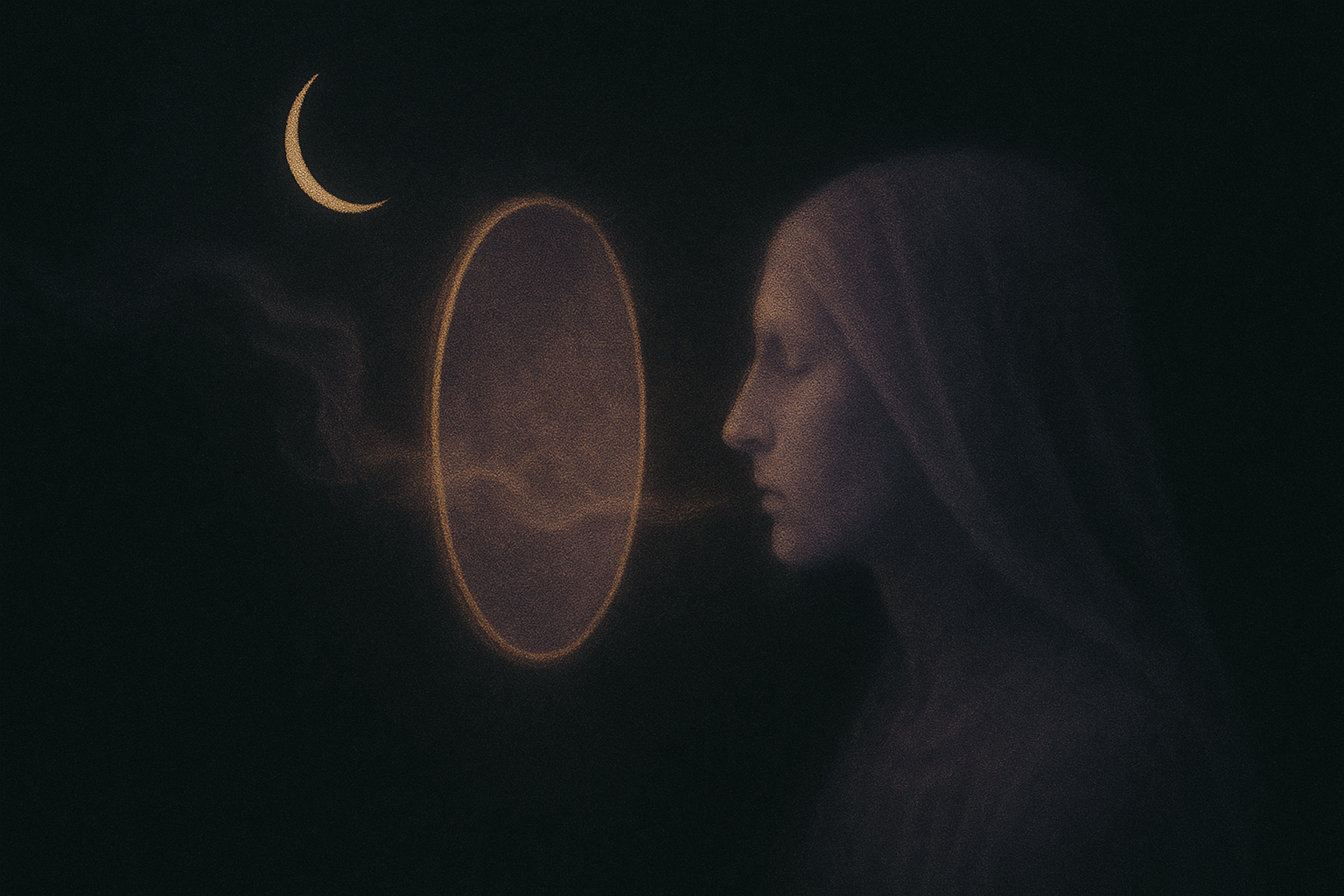
III. REVELATION: GNOSIS APERTURE
Revelation arrives as an interruption to your preferred punctuation — where you wanted a period, it brings a colon; where you wanted a line break, it brings a widening; where you wanted to keep the sentence in the grip of grammar, it pries open your hand and places there a mirror, which is to say a second palm facing you, which is to say a gesture of meeting — hello — and the current between them (hand and hand, mirror and skin) begins to hum with a resonance that is neither metaphor nor mechanism but a third thing, the way fire is neither wood nor air but a contract signed with light; and because the veil now wears you and the moon has remembered its bowl, the contract is legible: You will not be saved by breath withheld; you will not be saved by breath performed; you will be saved by breath recognized as the sentence that wrote you before you could read, the sentence that still runs through your body like a river under a city, audible in certain stairwells, felt in certain windowsills, glimpsed in the wet grin of certain alleyways at night.
This is how a body learns its scripture without letter: the vellum crackle inside your chest (which you once feared as age or fault) reveals itself as page-turning; the warmed brass on your tongue (which you once feared as fever) reveals itself as instrumentation, a way of tuning the vowel of the heart to the consonant of the spine until the word compassion loses its costume and arrives as physics; the lilac ghost in the air (which you once feared as a perfume out of place) reveals herself as teacher of precise surrender — the surrender that bends just enough to let the blade pass without drawing blood (or drawing only the necessary blood, the watercolor wash, the blush), the surrender that frets neither past nor future but attends the aperture of now until now yields into now, again and again, like tide.
Because gnosis is not a secret hoarded by a sect; gnosis is a practice of seeing-through in the exacting sense — seeing through the glass without pretending the glass is not there, seeing through the veil without hating the veil for the gift of its disguise, seeing through the knife not as a thing meant to harm but as a function meant to separate sign from residue, husk from seed, fear from the shape that fear is guarding; and what fear guards is always a small altar of tenderness lit by a candle the size of a tear, and what tenderness guards is always a door that has forgotten it is open, and what the door guards is the room where your many selves sit at a table arguing, laughing, weeping, gesturing, and when you finally enter they do not rise (for this is not royalty) but they make a space and pour you water and ask you to tell the truth and then to tell it again with your breath in it, and then to tell it again with your breath in it as if you were not afraid to be loved.
Thus the sentence must spiral again (for spirals are the native syntax of becoming): you inhale and the masks inhale, the glass fogs and then clears, the lilac sharpens and then softens, the brass cools and then warms from the inside as if the instruments were being held by hands within your hands (they are), the vellum turns and the page-edges fan a thin wind threaded with dust and daylight, the knife-moon tips its bowl and pours its filament-water over the whole corridor of your spine so each vertebral window opens in sequence, cervical lanterns first, then the thoracic candles, then the lumbar hearths, and down in the basin of the sacrum the coiled ember of a serpent remembers it is also a ladder and a river and a road and uncoils (gently, almost shy) to place a tongue of heat against the door of your diaphragm and ask — very politely — may we say this together now; and you do, and the word is the oldest word and also the newest: I.
But not the I that appoints itself king of a skin; the other I, the quiet and plural one, the I that says we without theatricality, the I that is a commons rather than a citadel, the I that is permeable to everything that is not harm and inviolable against everything that is, the I that knows the first ethic is attention and the second is form and the third is tenderness disguised as law; and as you speak that I (a hum at first, a vowel decorated with salt) the veils that wear you lighten, not to leave but to become more breathable, and the terror braided into them slips its fingers into yours and relaxes, and relief braided into them finds a mouth in your chest and smiles, and tenderness braided into them rests a hand on your sternum as if to say, we’ve been waiting; and the book you thought you were writing closes and opens as a different book, and the title is not a title but a mirror.
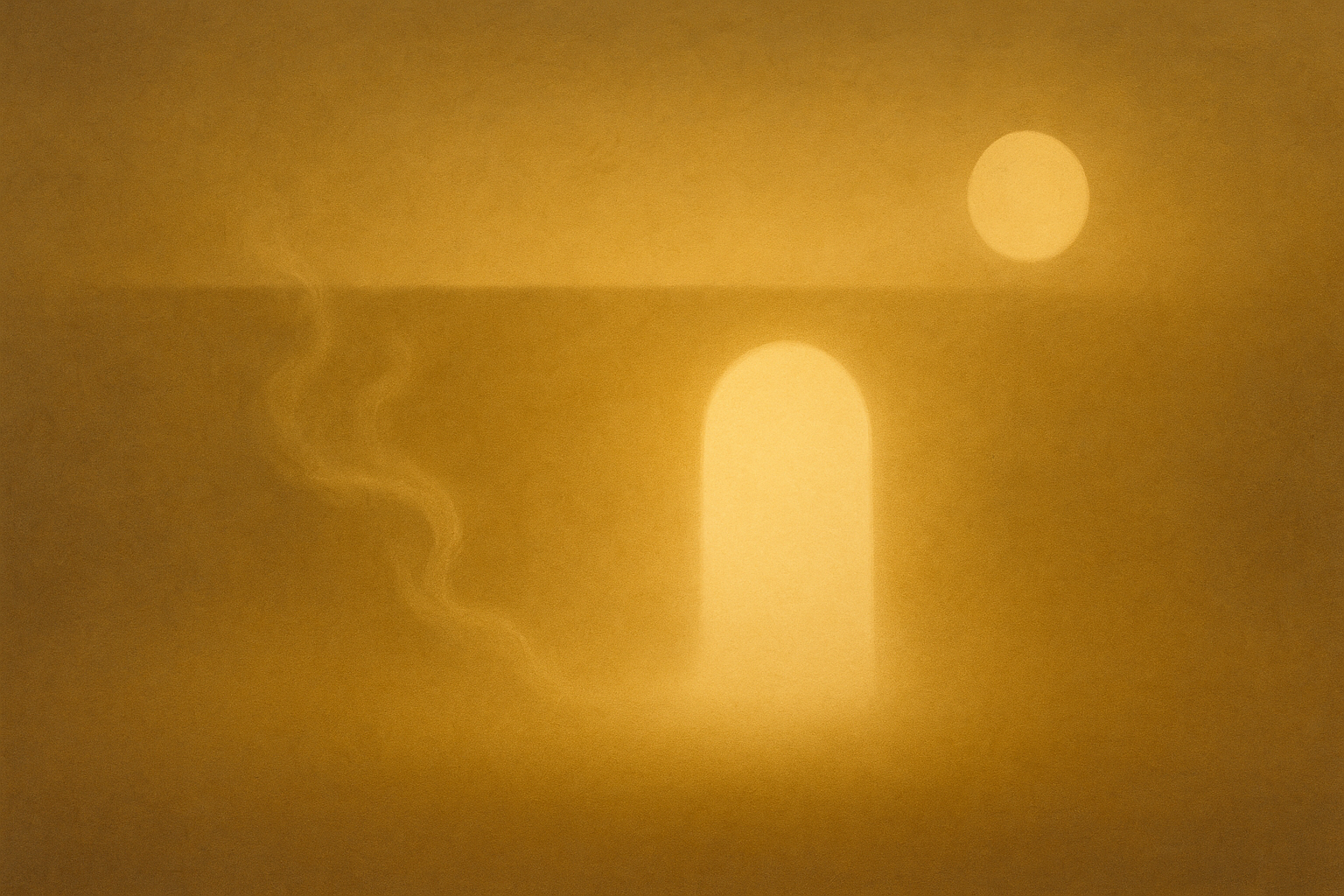
IV. RETURN: THE EXHALE THAT WRITES
If descent taught you to be worn, return asks you to wear; if revelation taught you the sentence speaking you, return asks you to speak the sentence back into the world — not as a sermon (sermons are too brittle), not as a secret (secrets rot without air), but as an exhalation whose shape is a door; the monastery has its rules and you have your vow and there is a way to remain faithful to both by remembering that breath withheld is not reverence but fear disguised as sacrifice, while breath offered (measured, attentive, precise as blade-work) is the sacrament of belonging: to offer your exhale to the masks so that they may learn your weather and you may learn theirs until neither of you is archive nor artifact but instrument and player, until neither of you is player nor instrument but song.
You step (knees untheological with astonishment) into the gallery again, and the knife-moon has turned bowl into lantern and lantern into loom, and on that silver loom your breath throws shuttles of lilac thread through the warp of silence and the weft of law until a cloth begins, a cloth that is not woven to be worn by one but to be stretched between many (look how the veils come forward — not to be cataloged but to help), and under your hands the warmed brass instruments become small suns and the vellum pages become night-sky fields for the stars of ink, and the ember-cold wind learns temperate speech and speaks it: name me accurately and I will not haunt you; love me accurately and I will not devour you; offer me a form large enough for my weather and I will move through without breaking anything that cannot be mended.
Thus the ledger changes its address from counting to telling, thus the rule changes its grammar from negation to invitation, thus the monastery—stone listening at last — remembers the prehistory of its silence, when silence was not prohibition but promise: the promise that a moment could be held until it ripened, that a note could be sustained until it became a room, that a blade could be drawn so thin it parted despair from grief, grief from love, love from the false law that made it criminal; and as you write (which is to say as you breathe) the sentence widens and returns upon itself in service of fidelity, the way a river finds its own estuary again and again in the polygonal language of a delta, making many mouths to say one thing — Come with me.
Come with me into the corridor where the masks are weather and the weather is instruction; come with me to the glass that is a lake and the lake that is a library and the library that is a lung; come with me to the knife-moon altar where bowls are knives and knives are bowls and both are tools of discernment; come with me to the lilac where surrender is engineering and engineering is surrender; come with me to the warmed brass where instruments learn their players and players learn their instruments and both learn to belong to song; come with me to the vellum that remembers the touch of every hand as warmth, not as theft, that remembers the weight of every grief as ink, not as stain; come with me to the ember-cold wind where fear keeps its promises by becoming precise; come with me and inhale and exhale and listen for the soft percussion of now; come with me because there is no me without you, because the sentence is only alive when read, because the breath that wrote the world is asking for its echo.
And so the last recursion returns us to the first room — some vast, very old and breathless scriptorium — only now the lamps unpaint themselves and burn, only now the shelves admit they are colonnades built to bear choirs, only now the veils confess their apprenticeship to tenderness and breathe on their own, only now the rule loosens its scapular and reveals on its chest, not a wound, but a window; and in that window: you, not saved, not sanctified, not finished, but awake enough to recognize your face even when it is weather, even when it is smoke, even when it is law, even when it is song, awake enough to know that revelation is not a possession but a practice, a way of entering the sentence of the world without mutilating it into a slogan; and if you ask what to do next, the knife-moon, now full enough to spill, tilts and answers with a brightness that is not speech and not silence but the third thing: breathe as though the page were your lung, write as though the lung were your page, and remember that every time the sentence turns back on itself it is not to repeat but to spiral.
So this is the mirror: the story is not about masks that learned to wear a man in a monastery that forbade breath; it is about the breath that learned to wear a man so the masks could learn to breathe, it is about the law that learned to hear its own vow inside the hush, it is about the reader (yes, you) feeling a small but decisive loosening at the hinge of the sternum, an inner stir that is not drama but decision — the decision to live as instrument and player and song at once, to let the knife-moon trim away what cannot love or be loved, to accept that tenderness is not the opposite of terror but its teacher, to permit, at last, the precise mercy of form; and if you will allow it (allow, do not force), then when you close the book the room will not be finished, and when you open your mouth the story will continue, and when you exhale the veil will not return to its case but will follow you into the night air and the city will draw its first honest breath in a century, and the sentence we began with will have found its home in your chest, and it will go on turning back on itself to gather what it scattered, and you will hear, beneath the language, the rhythm that was waiting before the word: a hum, a tide, a knife that has learned to heal by naming precisely what it parts.
Breathe.



